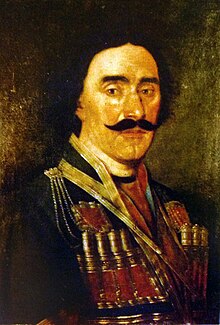|
'''Solomon I''', "the Great", ({{lang-ka|სოლომონ I დიდი}}) (1735 – April 23, 1784), of the ], was ] (western ]) from 1752 to 1766 and again from 1768 until his death in 1784. |
|
'''Solomon I''', "the Great", ({{lang-ka|სოლომონ I დიდი}}) (1735 – April 23, 1784), of the ], was ] (western ]) from 1752 to 1766 and again from 1768 until his death in 1784. |
|
Solomon was a son of ] by his second wife Tamar née ] and succeeded upon his father's death in 1752. He immediately launched a series of stringent measures against the renegade nobles and slave trade from which they profited in conjunction with the ]. In 1752, the aristocratic opposition staged a coup, but Solomon quickly regained the crown and began a program of reforms aimed at stabilizing the kingdom torn apart by chronic civil wars. The Ottomans, which saw Imereti as the sphere of their influence, sent in an army, but Solomon succeeded in mobilizing his nobles around him and defeated the invaders at the ] in 1757. The same year, he forged an alliance with his kinsman, ], who ruled in eastern Georgia. He defeated two more Ottoman invasions (20,000 strong and 13,000 strong). The Ottoman instigated invasion of North Caucasus tribes, one of which succeeded, while second one was thwarted. Briefly, Ottomans took Kutaisi in 1765 and placed his cousin, ] on the throne. In 1767, Solomon managed to stage a comeback, and freed Imereti of Turks again. Next year, another ] broke out, and in May 1769, Solomon traveled to ] to meet with Heraclius II. The two kings decided to request five ] regiments and join the war with the Ottoman Empire in exchange of the guarantee that Georgian interests would be protected in the final Russo-Turkish peace deal. The Russians sent a small force under General ], but the general's rudeness and condescension alienated the Georgians; Totleben was quickly recalled from Georgia. After the war was over, Solomon was able to force his autonomist vassals, princes of ] and ], into submission, and continued antagonizing the Ottoman hegemony in the region. Ottomans had no choice but to sign a treaty with Imereti, by which Imeterti was no longer Ottoman vassal, slave trade was not even mentioned, with symbolic tribute of 60 women annually (did not stipulate them to be Georgians, and Solomon never honored this clause anyway). He crushed the Ottoman-sponsored invasion from ] in 1779, he made a series of forays into the Turkish-controlled southwestern Georgian lands. He died in March 1784 and was buried at the ]. He was canonized by the Georgian Orthodox Church on 22 December 2016, his feast day set for 23 April (] 10 April).<ref>{{cite news|title=წმინდა სინოდმა წმინდანებად ორი მეფე - ბაგრატ მესამე და სოლომონ პირველი, ასევე, კათოლიკოს-პატრიარქი კალისტრატე ცინცაძე შერაცხა|url=http://geotimes.ge/index.php?m=5&news_id=36445|accessdate=25 December 2016|work=Georgian Times|date=22 December 2016}}</ref> |
|
Solomon was a son of ] by his second wife Tamar née ] and succeeded upon his father's death in 1752. He immediately launched a series of stringent measures against the renegade nobles and slave trade from which they profited in conjunction with the ]. In 1752, the aristocratic opposition staged a coup, but Solomon quickly regained the crown and began a program of reforms aimed at stabilizing the kingdom torn apart by chronic civil wars. The Ottomans, which saw Imereti as the sphere of their influence, sent in an army, but Solomon succeeded in mobilizing his nobles around him and defeated the invaders at the ] in 1757. The same year, he forged an alliance with his kinsman, ], who ruled in eastern Georgia. He defeated two more Ottoman invasions (20,000 strong and 13,000 strong). The Ottoman instigated invasion of North Caucasus tribes, one of which succeeded, while second one was thwarted. Briefly, Ottomans took Kutaisi in 1765 and placed his cousin, ] on the throne. In 1767, Solomon managed to stage a comeback, and freed Imereti of Turks again. Next year, another ] broke out, and in May 1769, Solomon traveled to ] to meet with Heraclius II. The two kings decided to request five ] regiments and join the war with the Ottoman Empire in exchange of the guarantee that Georgian interests would be protected in the final Russo-Turkish peace deal. The Russians sent a small force under General ], but the general's rudeness and condescension alienated the Georgians; Totleben was quickly recalled from Georgia. After the war was over, Solomon was able to force his autonomist vassals, princes of ] and ], into submission, and continued antagonizing the Ottoman hegemony in the region. Ottomans had no choice but to sign a treaty with Imereti, by which Imeterti was no longer Ottoman vassal, slave trade was not even mentioned, with symbolic tribute of 60 women annually (did not stipulate them to be Georgians, and Solomon never honored this clause anyway). He crushed the Ottoman-sponsored insurrection in ] in 1779, and made a series of forays into the Turkish-controlled southwestern historic Georgian lands. He died in March 1784 and was buried at the ]. He was canonized by the Georgian Orthodox Church on 22 December 2016, his feast day set for 23 April (] 10 April).<ref>{{cite news|title=წმინდა სინოდმა წმინდანებად ორი მეფე - ბაგრატ მესამე და სოლომონ პირველი, ასევე, კათოლიკოს-პატრიარქი კალისტრატე ცინცაძე შერაცხა|url=http://geotimes.ge/index.php?m=5&news_id=36445|accessdate=25 December 2016|work=Georgian Times|date=22 December 2016}}</ref> |
|
Solomon I was married three times; first, to Princess Tinatin Shervashidze, second to Princess Mariam, daughter of ] (died 1778), ], and third, Princess Gulkan ] (1730–1800). He had five children, three sons and two daughters: |
|
Solomon I was married three times; first, to Princess Tinatin Shervashidze, second to Princess Mariam, daughter of ] (died 1778), ], and third, Princess Gulkan ] (1730–1800). He had five children, three sons and two daughters: |

